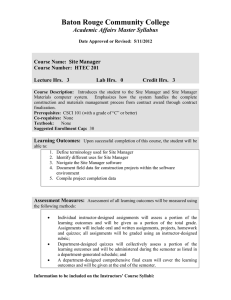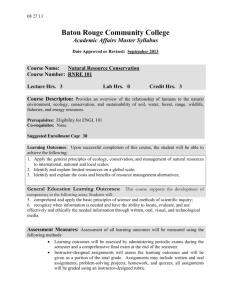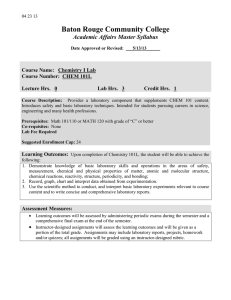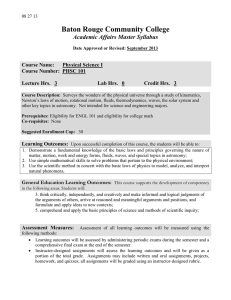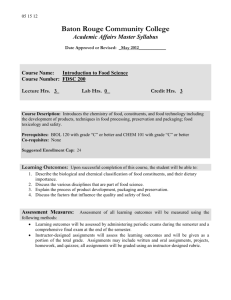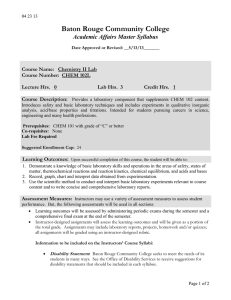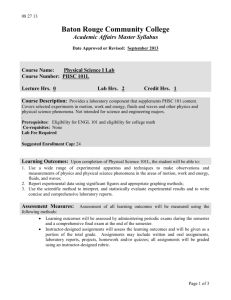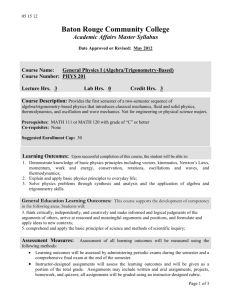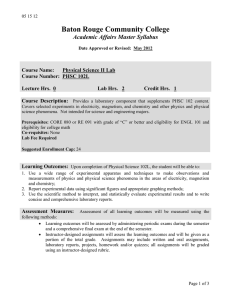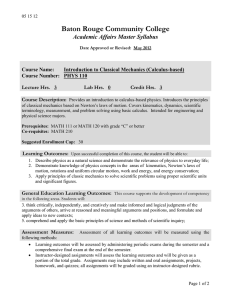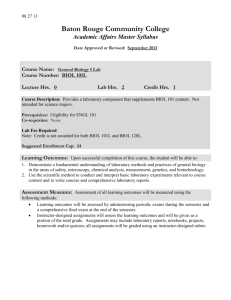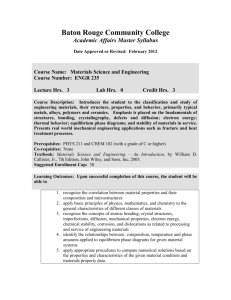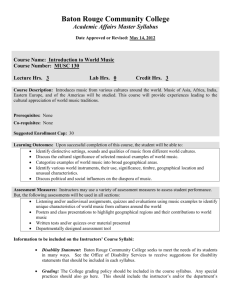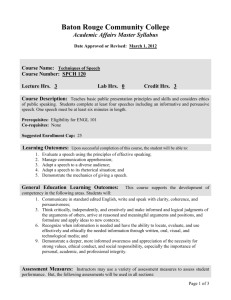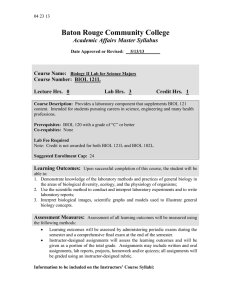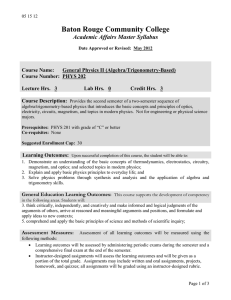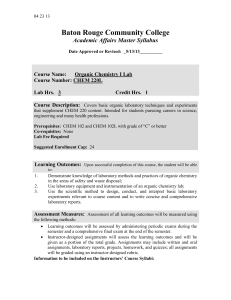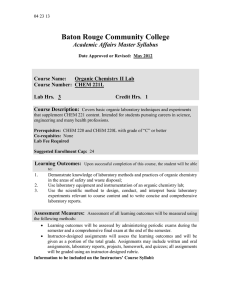PHYS 200 - Baton Rouge Community College
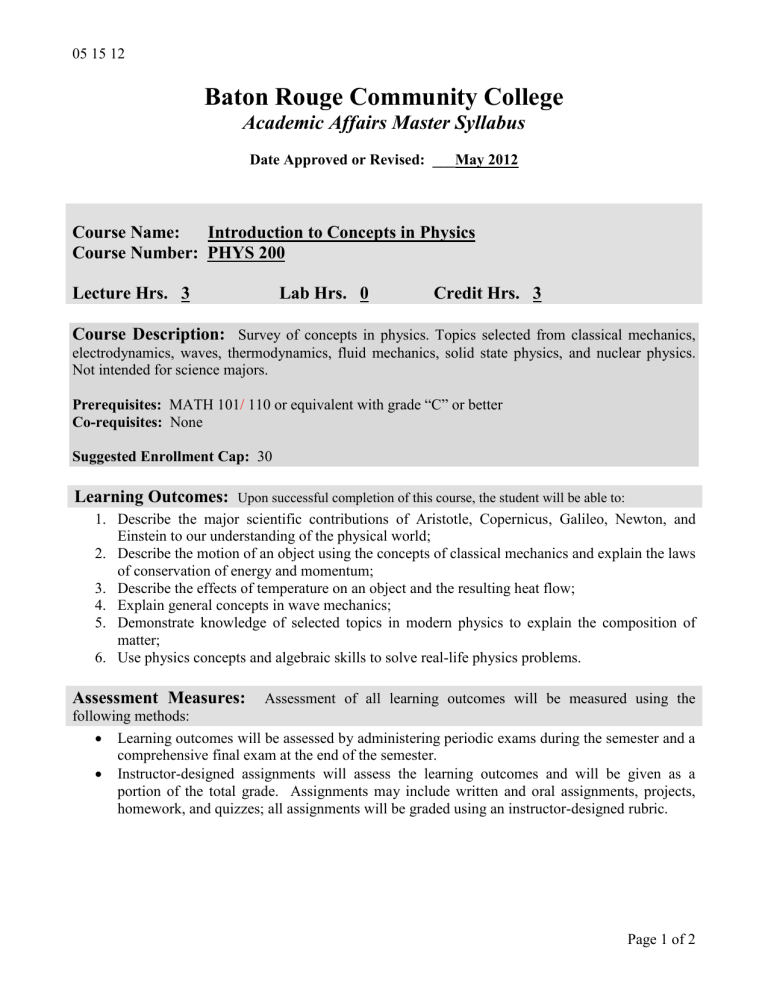
05 15 12
Baton Rouge Community College
Academic Affairs Master Syllabus
Date Approved or Revised: ___May 2012
Course Name: Introduction to Concepts in Physics
Course Number: PHYS 200
Lecture Hrs. 3 Lab Hrs. 0 Credit Hrs. 3
Course Description:
Survey of concepts in physics. Topics selected from classical mechanics, electrodynamics, waves, thermodynamics, fluid mechanics, solid state physics, and nuclear physics.
Not intended for science majors.
Prerequisites: MATH 101 / 110 or equivalent with grade “C” or better
Co-requisites: None
Suggested Enrollment Cap: 30
Learning Outcomes:
Upon successful completion of this course, the student will be able to:
1.
Describe the major scientific contributions of Aristotle, Copernicus, Galileo, Newton, and
Einstein to our understanding of the physical world;
2.
Describe the motion of an object using the concepts of classical mechanics and explain the laws of conservation of energy and momentum;
3.
Describe the effects of temperature on an object and the resulting heat flow;
4.
Explain general concepts in wave mechanics;
5.
Demonstrate knowledge of selected topics in modern physics to explain the composition of matter;
6.
Use physics concepts and algebraic skills to solve real-life physics problems.
Assessment Measures:
Assessment of all learning outcomes will be measured using the following methods:
Learning outcomes will be assessed by administering periodic exams during the semester and a comprehensive final exam at the end of the semester.
Instructor-designed assignments will assess the learning outcomes and will be given as a portion of the total grade. Assignments may include written and oral assignments, projects, homework, and quizzes; all assignments will be graded using an instructor-designed rubric.
Page 1 of 2
05 15 12
Information to be included on the Instructors’ Course Syllabi:
Disability Statement: Baton Rouge Community College seeks to meet the needs of its students in many ways. See the Office of Disability Services to receive suggestions for disability statements that should be included in each syllabus.
Grading: The College grading policy should be included in the course syllabus. Any special practices should also go here. This should include the instructor’s and/or the department’s policy for make-up work. For example in a speech course, “Speeches not given on due date will receive no grade higher than a sixty” or “Make-up work will not be accepted after the last day of class.”
Attendance Policy: Include the overall attendance policy of the college. Instructors may want to add additional information in individual syllabi to meet the needs of their courses.
General Policies:
Instructors’ policy on the use of things such as beepers and cell phones and/or hand held programmable calculators should be covered in this section.
Cheating and Plagiarism: This must be included in all syllabi and should include the penalties for incidents in a given class. Students should have a clear idea of what constitutes cheating in a given course.
Safety Concerns: In some programs this may be a major issue. For example, “No student will be allowed in the safety lab without safety glasses.” General statements such as, “Items that may be harmful to one’s self or others should not be brought to class.”
Library/ Learning Resources: Since the development of the total person is part of our mission, assignments in the library and/or the Learning Resources Center should be included to assist students in enhancing skills and in using resources. Students should be encouraged to use the library for reading enjoyment as part of lifelong learning.
Expanded Course Outline:
I. Measurement
A.
Standard and SI Systems
B.
Uncertainty in measurements and significant digits
II. Kinematics
III. Force and Acceleration
IV. Work, Energy and Momentum
V. Thermodynamics
VI. Sound and Electromagnetic Radiation
VII. Electricity and Magnetism
VII. Selected Topics in Modern Physics
Page 2 of 2
